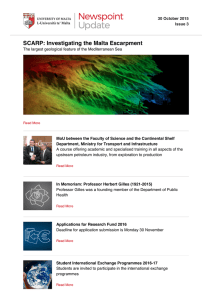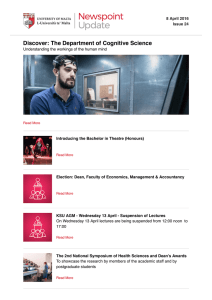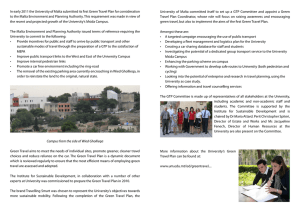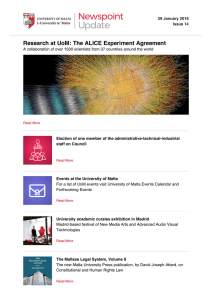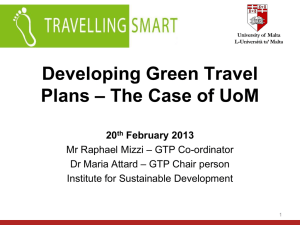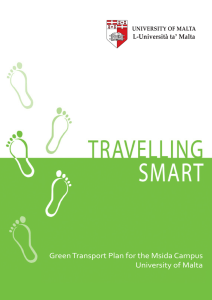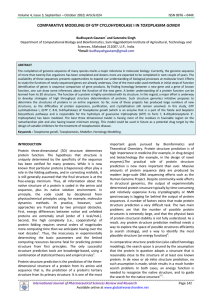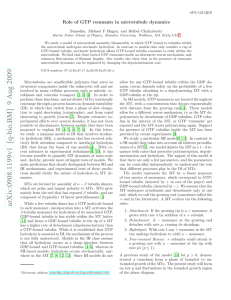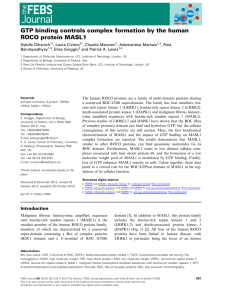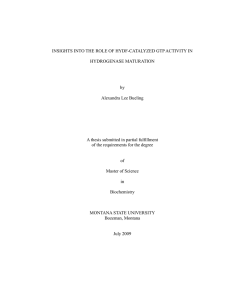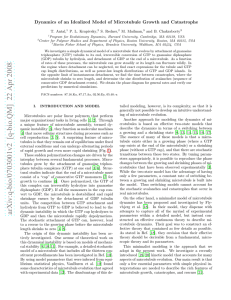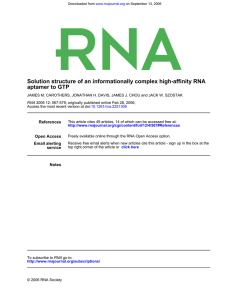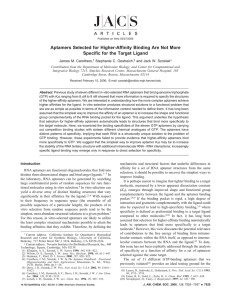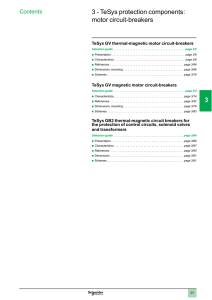The Green Travel Plan: An opportunity for Sustainable Mobility
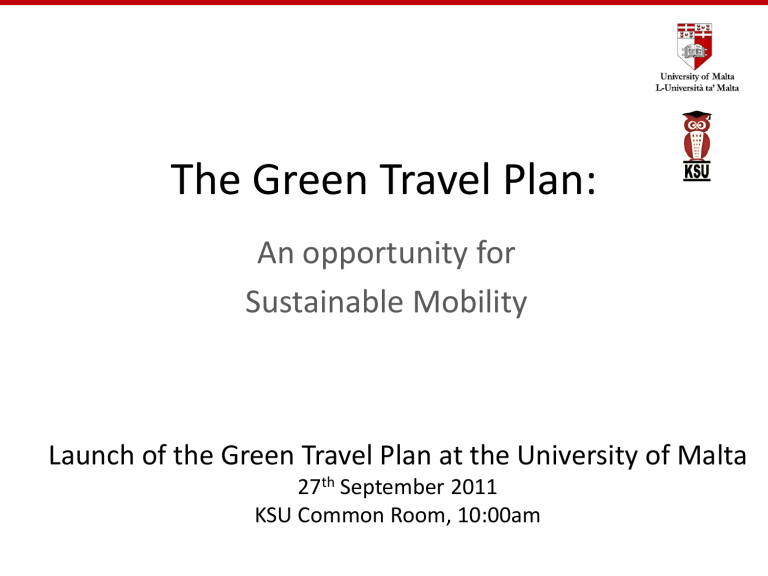
The Green Travel Plan:
An opportunity for
Sustainable Mobility
Launch of the Green Travel Plan at the University of Malta
27 th September 2011
KSU Common Room, 10:00am
Defining Green Travel Plans
• A package of measures tailored to:
– Meet the needs of individual sites,
– Aimed at promoting greener, cleaner travel choices and
– Reducing reliance on the car
• It involves the development of a set of mechanisms, initiatives and targets that together can enable an organisation to:
– Reduce the impact of travel and transport on the environment,
– Bring a number of other benefits to the organisation
The scope of GTPs
• The aim behind a travel plan is that those organisations responsible for creating the
need to travel , such as:
– employers,
– service providers and
– shopping centre owners, are involved in helping to solve transport problems
Short history of GTPs
• 1st time 1970s – USA, California as a result of the air
quality legislation
• 1980s – adopted by the Dutch
• 1990s – UK authorities; Nottingham City Council started adopting “green commuter plans”
• 1997 – the promotion of travel plans became UK Government policy; with workplace and school travel plans featuring in the
1998 and 2004 transport policy White Papers
Benefits of GTPs
• Increases walking and cycling, with associated health
gains
• Improved social inclusion
• Increases bus use
• Better conditions for employees
• Assist in meeting environmental management standards
• Financial savings
• Better estate management
• Less noise, congestion and pollution, and better conditions for freight distribution, associated with reductions in car use
• Better security and less fear of crime from better car parking management.
A Green Travel Plan for the
University of Malta
The need for a GTP
• UoM was required to develop a Green Travel Plan by the
Malta Environment and Planning Authority following its various planning applications aiming at increasing the capacity of the University’s Msida Campus.
• The Terms of Reference for the GTP were developed by MEPA and required to fulfill the obligations of the development planning application.
• A number of experts headed by the Institute for Sustainable
Development were commissioned to draw up the GTP by the
Estate and Works Department at the University.
• The UoM GTP was finally approved by MEPA in March 2011 and is considered the starting point of a long process of change.
Existing Situation on Campus
• Public Transport
• Parking facilities, traffic and pedestrian activity
Reasons for existing travel patterns
• Overall high car dependence amongst staff.
• Free parking allocations to students, academic and non-academic staff;
• The flexible working conditions of academics with complex travel patterns;
• High car dependence amongst students which do not stay at University during the day increasing the amount of travel to and from Msida on a daily basis.
Travel Behaviour of UoM Users
• Academic staff
This group are most reliant on private transport and have complex travel patterns throughout the day and week;
• Non-academic staff
This group is dominated by a large proportion of people dependent on private transport however with simpler travel patterns which are mostly fixed to strict working hours.
• Students
This group is still very much dependent on public transport despite the complex travel patterns they display throughout the week.
Important findings
• Users find traffic and parking as major problems facing drivers.
• 80% of respondents do not have dependents (minors or elderly) to chauffer around with their car.
• 24% would never car share.
• A high percentage of staff and students have access to University with a direct bus service. Others have one interchange with an express service.
• Overall positive attitude towards changing transport mode.
Survey responses on modal shift
12
The Green Travel Plan
• The GTP looks at efforts to encourage modal
shift by raising awareness of the need to
reduce travel, particularly travel by private car.
• The University has set up a GTP Committee to overlook the progress achieved by University.
• Research will be encouraged in this area to widen the knowledge of green travel in the local context.
GTP Committee
• Dr Maria Attard , Senior Lecturer in Geography, Director
of the Institute for Sustainable Development - Chair
• Perit Christopher Spiteri , Director Estate and Works
• Mr Stefan Balzan , President KSU
• Prof Luciano Mulé Stagno , UMASA representative
• Ms Nathalie Cauchi , Non-academic and support staff representative
• Ms Jacqueline Fenech , Director Human Resources represented by Henry Aquilina
• Mr Joseph Camilleri , Precincts Officer
• Ms Maronia Schembri , Precincts Office
• Ms Thérèse Bajada , Asst. Lecturer, Institute for Sustainable
Development
• Ms Stephanie Stellini , Graduate Trainee, Institute for
Sustainable Development - Committee Secretary
A Green Travel Plan for the
University of Malta
Keep updated on www.um.edu.mt/isd/greentravel
Thank you
16
